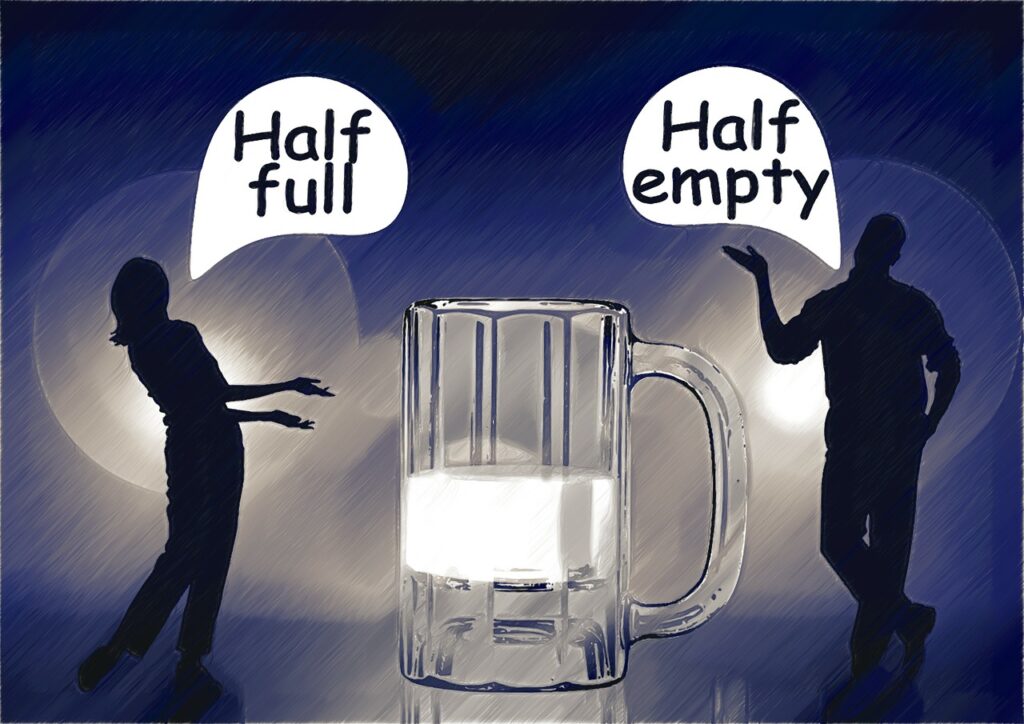Conflict and confrontation can be your friend.
Sign up for our Assertive Way Weekly Newsletter for confident speaking up tips and inspiration to boost your career!
We take your email seriously and will never sell or share it.
If you are the kind of person that is very nice, or if you want to make sure you don’t hurt other people’s feelings, or if you really want people to like you, chances are you dread conflict and confrontation.
Ironically, by avoiding conflict and not bringing up important issues that bother you in a timely manner, you may end up hurting people, being mean, and pushing people away from you.
Sooner or later, you’ll feel misunderstood, stressed, and taken for granted. Which means that over time you’ll start to feel resentful and frustrated towards others. And even if you don’t say anything it can come across in your mannerisms, micro expressions, tone, and body language which means you’ll trust people less, assume they’re trying to take advantage of you, and to be more difficult.
Not only that, but you’ll also start to have the “poor me” mindset, which most people don’t find pleasant. All of this non-verbal and verbal negativity will come across and push people away from you.
Why You Dread Conflict And Confrontation
And the reason you run away from conflict or confrontation like dogs runs away from fireworks on New Year’s Eve is that it’s scary and uncertain. And the more you run away from conflict and confrontation, the scarier and more uncertain it will be.
As an innocent child, many of us have been taught false truths about conflict, speaking up, and confrontation to keep us quiet and easy to manage.
On top of that, films and TV series often portray confrontation in an extreme way with lot of yelling, fights, loud arguments, relationship battles, drama, attention-grabbing hostile break-ups and even deaths to keep the audience’s attention. But that’s not what mature, real-life confrontation looks like!
There Is A Good Reason For Your Concern Of Conflict
Most people handle differences very poorly which can lead to breakups, epic fights, and never speaking again, because they were never taught the right skills.
What’s worse, they don’t even know that there is a skill to speak up and resolve differences to begin with. They don’t know that there is a skill that will teach them how to handle disagreements in a positive, helpful, and relationship-bonding way.
It’s time to reassess your ideology around conflict and handling differences and bring it back to plain everyday reality that is way less scary than your subconscious feels it is, especially when you know how to speak up in a kind way.

When Conflict And Confrontation Become Normal
After you start to not only accept, but also to invite and rub shoulders with a healthy dose of proper confrontation and conflict into your life, you’ll stop fearing it.
You’ll start getting more of what you want. You’ll notice that people will start to look at you in a more respectful way and to talk to you like you matter. And because of that, you’ll start to have much better relationships.
By overcoming differences together, you’ll understand people and they’ll understand you at a much deeper level, which will allow you to bond and connect with people in a way you haven’t ever done before. Not only that, but you will also be authentically you. And that is always much easier.
What Is Conflict And Confrontation Afterall?
Let’s start with understanding what conflict and confrontation really is about. Conflict simply means there is a disagreement regarding views or interests between two or more people and there’s an attempt to resolve the disagreement.
Confrontation simply means to challenge or speak up with another person to deal with opposing views on something, especially when it is face to face.
3 Types Of Conflict
According to Harvard Law School Program On Negotiation, there are 3 types of conflict that are common at work: task conflict, relationship conflict, and value conflict.
- Task conflicts are about differences in the use of resources, processes, expectations, and interpretation of facts. For example, your coworker tries to get you to take on their work, and you don’t think it should be done by you.
- Relationship conflict is about differences in personality styles. For example, your boss likes to micromanage, and you like to work with autonomy. Or your coworkers are ultra-competitive, and you are collaborative.
- Value conflict is about differences in values and beliefs. For example, you value transparency in information sharing, but your manager or your employee doesn’t think information should be shared unless you need it to do a specific job.
6 Myths About Conflict
Here are 6 common myths about conflict and confrontation. These are lies that teachers, parents, and TV like to tell about confrontation that ruin it for you as an adult.

1. Conflict and confrontation are bad.
Conflict itself is not good or bad. It just means there is a difference. The way people handle differences can make for good and bad confrontation and conflict.
Good conflict can create what is called “value creation” for the people involved. When there are constraints or friction, there is also a more dedicated effort to understand what people really think, want, and value, and an open and creative conversation can take place to create and expand opportunities for everyone.
Also, when people think and behave in a very similar way, there is less opportunity for growth compared to groups of people with very diverse personalities, interests, values, and backgrounds.
That’s why many leaders create diverse teams with diverse points of view by design to proactively have more productive conflict so that there can be better decision making.
Many organizations also arrange their organization chart to have constant mini-clashes and points of conflict. One example is requesting approvals from both finance, who want to keep the cost down, and sales, who want to spend more, so that there will better decision-making and outcomes in the end.
Another example are intercultural marriages which tend to have more points of conflict because there are more differences, which can become a strength for the couple if they handle it those differences with elegance.
2. Conflict is caused by difficult, angry, or aggressive trouble-making people.
Angry, difficult, aggressive people may cause a lot of unnecessary and negatively charged conflict.
But conflict can also be used to productively to solve differences in an open, direct, honest, and respectful way. Good leaders are very skilled at confronting their team and coworkers and engaging in conflict in a productive way.
Historical heros often caused conflict before a solution was achieved. For example, Nelson Mandela stirred up some conflict even with a message of peace before he was able to make some progress in seeking racial justice.
3. Conflict means there’s a problem in the relationship.
If your pet puppy starts to make a mess on your carpet, you confront the puppy and a mini conflict happens. As a result, the puppy understands that not making a mess on your carpet will make you happy, and they’ll eventually stop doing it, and you and your dog will live happily ever after.
But if you allow your puppy to do things that you don’t like, you might get fed up and not allow the dog to live in the house with you anymore or you might even want to get rid of your dog. That’s no longer a happily ever after story. The right dose of conflict done in the right way enhances relationships for the better.
The lack of conflict means there is a problem in the relationship. It means that at least one person, usually the less alpha or dominant one, is feeling misunderstood or ignored.
Conflict and confrontation are normal and important to have healthy, positive, and trusting relationships. The closer the relationships, the more joint decisions and interdependencies there are.
Each person has their own individuality, own thinking and upbringing, which makes it is natural that they diverge in some ways. And that requires some level of conflict and confrontation to resolve those differences so that they don’t grow out of proportion.
4. Time will heal the pain without the need for conflict.
Some people believe that differences will naturally resolve themselves with enough time by themselves.
While time does heal pain of the past, it won’t heal an unresolved difference that continues to create pain today, and tomorrow, and the day after tomorrow.
If you got overworked and sick for one month one year ago, you’ll heal with time. But if you’ve been overworked and sick for a whole year because the work-life balance has not been dealt with, then you’ll have even more mental, emotional, and physical damage than before and you might even fall into depression.
Differences will often grow out of proportion when not resolved in a timely manner. When people don’t speak up because of the fear of confrontation, they are not only delaying the inevitable, but they are creating unnecessary ongoing tension while conflict doesn’t happen.
5. Confrontation is painful and overwhelming.
Driving is overwhelming until we learn to drive and start driving every day for a few months. Learning a new language is overwhelming until we understand the basics and can start to articulate some sentences.
In the same way, confrontation and conflict management are overwhelming until we learn how to use them skillfully and consistently with different people and different situations.
The truth is that confronting and managing conflict is a skill that you can learn and that gets easier with practice.
6. Kind people don’t confront.
Kind people confront others when they believe it will help solve the problem and help the relationship in the long run. They don’t avoid hard conversations because it is scary. And they speak up and confront in a kind, respectful, and caring way.
Often, family members who really care about a family member that is a drug addict may confront that family member in a firm and loving way with an intervention with the goal of helping them get out of that trouble. It’s hard, tough, even unpleasant, but they do it because they deeply care.
Avoidance of issues by being nonconfrontation or conflict avoidant is not nice and is not nice for your relationships.
Remember that people like kind honesty, not fake kindness. And overtime, they can tell the difference.
The faster you start to rub shoulders with kind confrontation and conflict, the faster you’ll feel more understood, be more recognize, and have better relationships.
To learn more about how to confidently and effectively handle hard conversations in an assertive way, visit https://www.assertiveway.com.

Sign up for our Weekly Newsletter for speaking up assertively tips and inspiration to boost your career!
We take your email seriously and will never sell or share it.
“Confrontation is a positive way to handle negative events.” – Steve Gilliland
